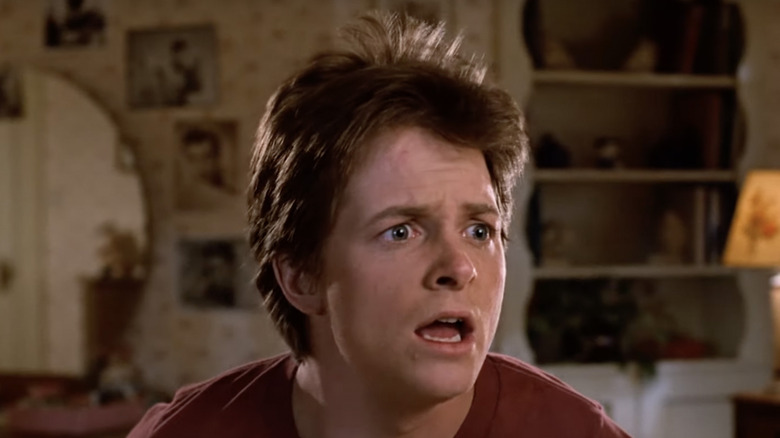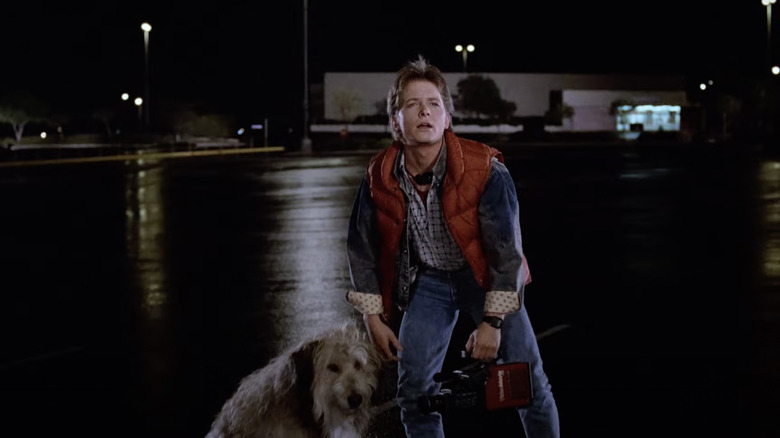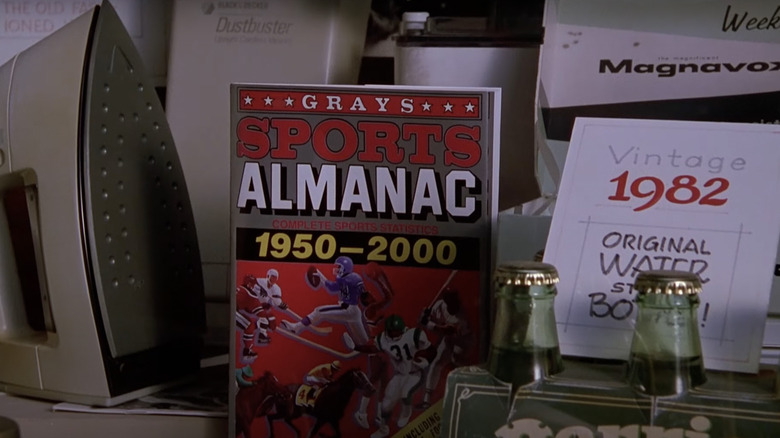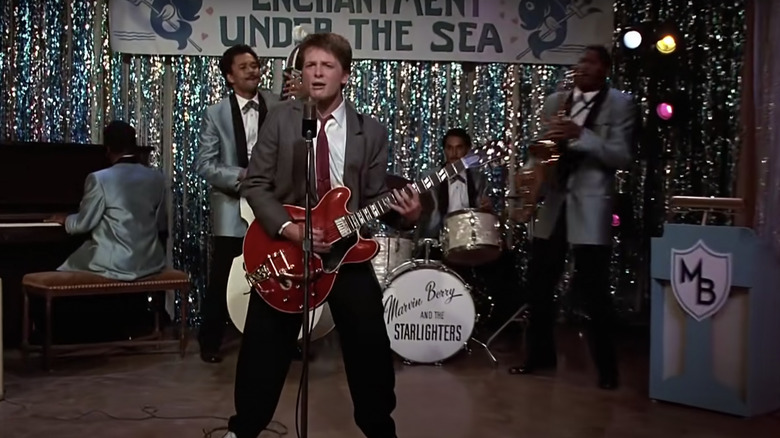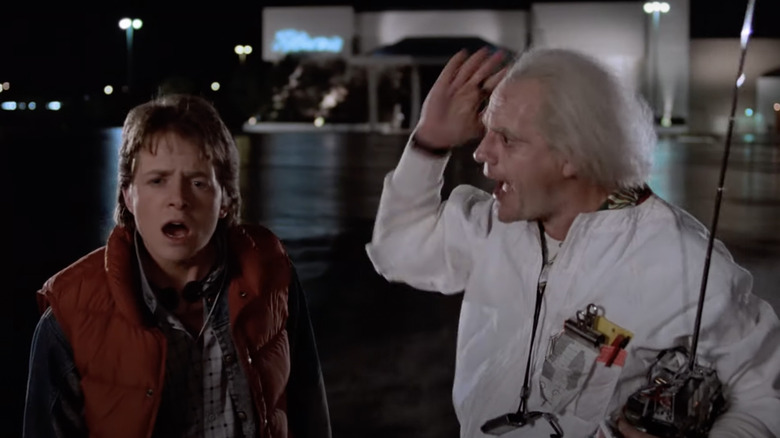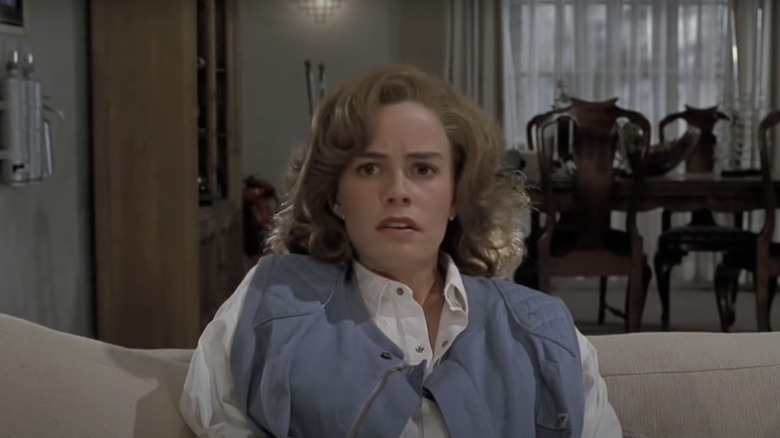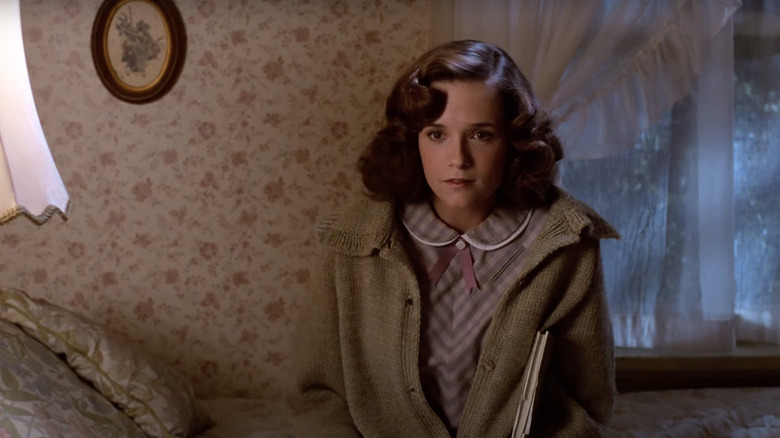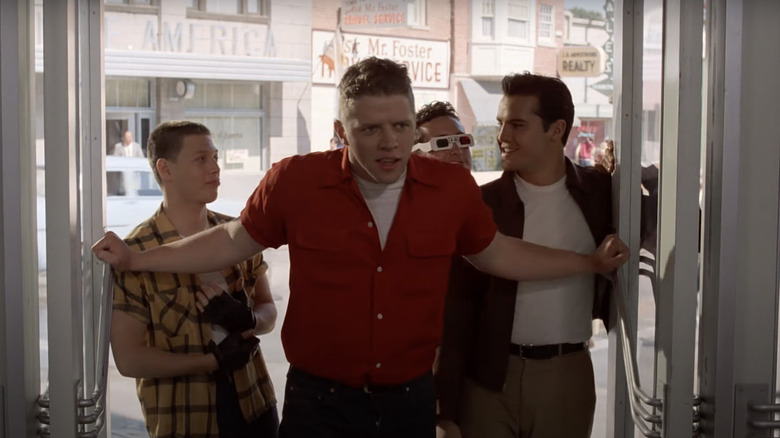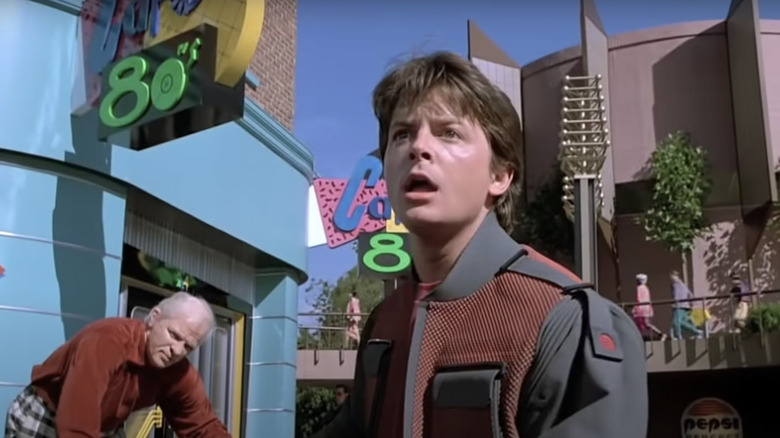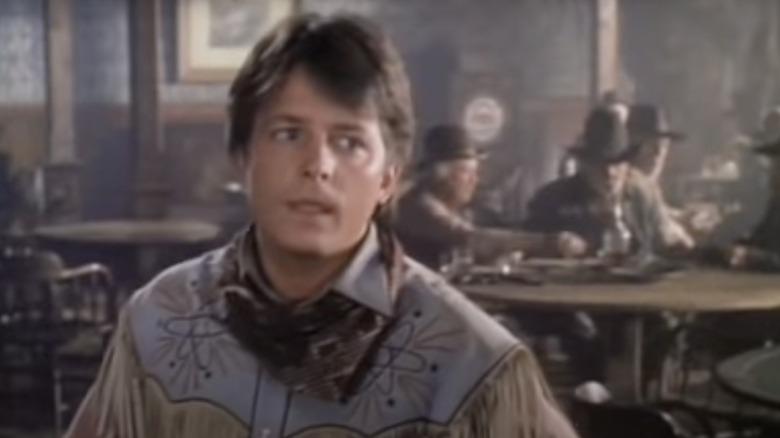The Most Terrible Things Marty McFly Has Ever Done
The thought of time traveling is, to say the least, intriguing –- and this concept is visited in great detail in the "Back to the Future" movies. Many productions have tried to copy it, but "Back to the Future" — and the two sequel films by extension — remain bona fide classics. That said, Marty McFly (Michael J. Fox), the charismatic teenager the series follows, has had to do some bizarre things to zap through the past, present, and future to save his friend, the eccentric Emmett "Doc" Brown (Christopher Lloyd), and morph time and reality back to its original place. "Back to the Future" proves that the trials and tribulations of time travel are messy. One small change can have a drastic effect on future events, erasing and then rewriting the previous history forever.
Though "Back to the Future" is a beloved classic, and we root for Marty, he's made some questionable decisions over the years. Most of his choices were for the well-being of his family -– not to mention social norms were different in the '80s and early '90s -– but that's only explains so much. Here are some of the worst things Marty McFly has ever done in the "Back to the Future" trilogy.
Marty tinkers with time and by extension people's fate
Marty has been known to tinker with time, though it's not entirely his fault. Doc got himself killed at the beginning of "Back to the Future," forcing Marty to jump in the time-traveling DeLorean, which zapped him to the past. This fiddling tends to mess with people's futures and fate.
By traveling to the past in the first film, Marty inadvertently prevents his parents –- Lorraine Baines (Lea Thompson) and George McFly (Crispin Glover) -– from ever meeting, which prevents him from ever being born. He then has to force the two together so they'll eventually fall in love, get married, and have children. We understand why Marty messes with time -– if he didn't, he wouldn't come into existence. But every time he changes something in the past, he seemingly alters the future in some way, whether it be positive or negative.
That said, if Marty didn't tinker with time travel in "Back to the Future," then Doc would have never worn a bulletproof vest at the end of the film –- and he would have died after he was shot.
Marty purchases the sports almanac
It's important to remember that Marty is just a kid. However, in "Back to the Future Part II," Marty goes off course when he buys a sports almanac that contains the results of major sporting events from 1950 to 2000. Reminder: His original timeline is in 1985, and Marty, Doc, and Jennifer Parker (originally played by Claudia Wells and then replaced by Elisabeth Shue) travel to 2015 to save their future kids in "Part II." Though Doc warns Marty of the implications of the almanac, it inevitably gets into the wrong hands: Biff Tannen (played by Thomas F. Wilson, who also stars as Griff Tannen and Buford "Mad Dog" Tannen). Naturally, Biff proceeds to steal the time machine and gives his younger self the sports almanac.
Though these events are eventually rewritten, Biff becomes wealthy, secretly kills Marty's father, and forces Marty's mother to marry him. Marty, unintentionally or not, briefly ruined his family's entire lives –- all in the name of greed –- by purchasing the almanac. Clearly, playing with time can have a butterfly effect on history, and Marty temporarily gets a full dose of that time warping nature.
Marty takes credit for Chuck Berry's 'Johnny B. Goode'
Through hard work and deception, Marty, at long last, successfully gets his parents back together. How does he follow up this victory? He plays the guitar at the school dance. This is all well and good until Marty unwittingly takes credit for the emergence of modern rock and roll, and steals Chuck Berry's masterpiece "Johnny B. Goode" in the process. Marvin Berry (Harry Waters, Jr.), Chuck's fictional cousin, hears the groundbreaking sound, which leads to the birth of rock and roll in this timeline as Marvin tells Chuck about it.
This might seem harmless, but in the real world, rock and roll was heavily influenced by Black American music, such as jazz and R&B. Yet Marty teaches one of the pioneers of the genre ... his own genre-defining music. To that end, this scene did birth an iconic line after the crowd was shocked to hear Marty shred on the guitar. He responds by saying: "I guess you guys aren't ready for that yet. But your kids are gonna love it."
He lets his temper get the best of him
If we've learned anything from the "Back to the Future" trilogy, it's that Marty McFly doesn't like to be called a chicken -– yet people continuously throw that title at him. The moment these words come out of the mouths of his enemies, he sees red and lets his temper take over.
For example, Buford, Biff Tannen's great-grandfather, challenges Marty to a showdown in "Back to the Future Part III," despite Marty not having the time or skill set to take him on. Yet, of course, his temper makes decisions for him. Doc even tells Marty not to give in to provocation, as it led to an accident in the future. In Marty's defense, he thought he'd be gone by the time the showdown took place.
In another off-the-screen moment, Marty is involved in a bad accident because he refused to turn down a street race against Douglas J. Needles (Flea). Luckily, he declines to street race when he's transported back to 1985 since he already knows what would happen if he were to partake. Marty's temper has led him down some pretty dark paths, which lead to drastic consequences.
Marty lets Doc use the sleep inducer on Jennifer
Although Marty appears to love his girlfriend Jennifer, he's done some questionable things to her. Case in point: Doc uses a sleep inducer on her in "Back to the Future Part II" because she apparently doesn't take to time travel as well as Marty. He then says Jennifer will think what she experienced was just a dream, which has creepy implications written all over it. They proceed to leave her lifeless body in an alley. Marty and Jennifer travel to the future to save their children. They succeed, but she's hardly involved. When they return to 1985, they once again leave her unconscious body, this time on her front porch. There are now bars on her window, because the neighborhood is apparently that bad in the refreshed timeline.
This might have, against all odds, been appropriate behavior in the late '80s, but it certainly doesn't fly today. Although Marty objects to all of this at first, it doesn't take much for him to go along with Doc's out-of-character plan and poor treatment of his girlfriend. Significant other or not, this isn't how you treat another human being. Luckily, Jennifer is safe in the end.
Marty plans on pretending to take advantage of his mother to get his parents together
Let this set in for a second: In "Back to the Future," Marty plans on pretending to take advantage of his own mother in the past so his father can step in and rescue her ... all in an attempt to get his parents together. For better or worse, his plan fails, yet Biff ends up making inappropriate advances on Lorraine. This allows George to actually intervene as a hero due to a real threat. George knocks out Biff, rescues Lorraine, they attend the dance together, and they get their happily-ever-after.
Also in this film, a younger Lorraine has feelings for her son. Though she doesn't know Marty is her son, Marty goes along with it. She even kisses him in one scene. He might have to go along with this occurrence since he's time traveling, but it doesn't take away from the fact that Marty pretends to take advantage of her. Somewhere in there, a plethora of lines are crossed.
He, rightfully or not, ruins Biff's life on multiple occasions
Biff is a bully through and through and he and his family make the McFly's lives seemingly worse -– no matter what timeline or setting they're in. Marty, after all, gets Griff, who's Biff's grandson, and his friends arrested, which actually saves Marty's future offspring.
Also, in "Back to the Future Part II," Marty and Doc return to 1985 to discover that Biff is wealthy, corrupt, and up to his usual tricks. He secretly killed Marty's father and forced Marty's mother to marry him, to boot. Doc even resided in a mental institution in this timeline, thanks to Biff's crooked behavior. In another Biff vs. Marty showdown, Biff even tries to kill Marty, who luckily escapes. Marty then proceeds to go back in time to 1955, so he can stop a future Biff from receiving the almanac. Marty eventually retrieves the almanac, destroys it, and negates the previous events. Biff also runs into a manure truck for good measure.
Though Biff (and whatever version actor Thomas F. Wilson is playing) is the antagonist of the films, Marty tends to ruin his life over and over again. Even when a version of Biff –- albeit rotten –- finally makes it, Marty comes in and rewrites history, making Biff's life worse in the process. In case audience members don't remember, Biff kicked off the franchise as George's evil supervisor.
Follows along on Doc's bizarre plans instead of putting an end to the madness
Though it's typically for a good cause, and Marty's first time traveling experience was by accident, he continuously follows along with Doc's bizarre plans instead of telling him enough is enough. Rather than accepting the future for what it is –- unpredictable chaos that doesn't always go people's way -– Doc and Marty traveled back in time to better their own lives. All that aside, Doc's method of time travel clearly hasn't been perfected (well, at least at first), but Marty endlessly helps a much older and outlandish character with his endeavors. Even if it means practically drugging his own girlfriend, kissing his mother, deceiving his parents, and the list goes on and on.
At a certain point, Marty should accept consequences and circumstances because a version of himself made those decisions. One can't just alter reality for their own welfare. Then again, that's pretty much the concept of the "Back to the Future" franchise.
Marty uses time travel to alter reality for personal gain
In "Back to the Future," Marty hops in the DeLorean to escape Doc's killer, which sends him back in time. Since he's already there, there's no harm in warning Doc that he dies in the future, but he decides to take it a step further by intervening in other people's lives, specifically in an attempt to get his parents together so he's eventually born. Yet all this reworking of reality mostly benefits him, his family, and Doc ... and, really, no one else. His father eventually becomes a successful author instead of working for Biff, his mother is happy as opposed to depressed, his siblings are finally successful, and Biff's life is turned upside down as he now works for George.
We understand why Marty messes with time -– who wouldn't want to save themselves and their family? But the fact that he does so for personal gain while ruining other people's lives in the process isn't exactly noble, even if Biff is apparently the worst person in the "Back to the Future" universe.
Ultimately, Marty is a kind-hearted teenager and he means well. And to keep a film interesting, characters need to be a bit complicated. As far as movie characters go, Marty has a pretty clean record. Luckily, events mostly work out in the end –- at least for everyone not named Biff, Griff, or Buford.
